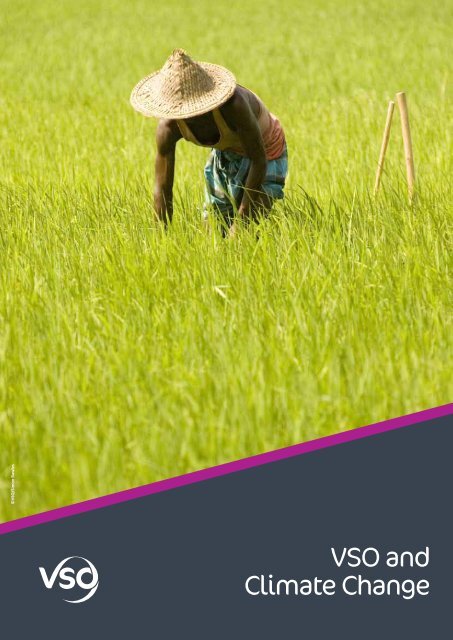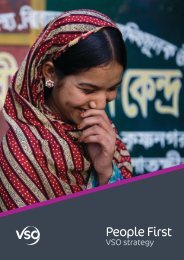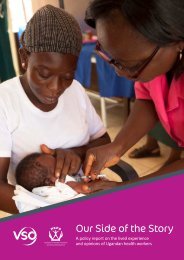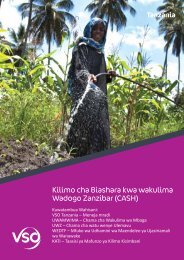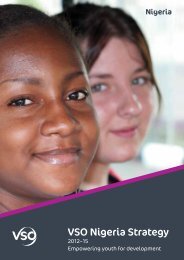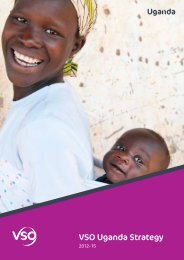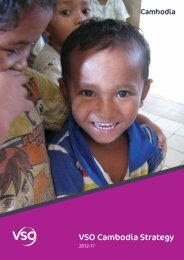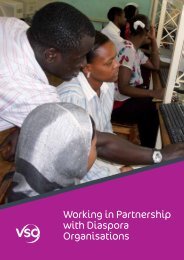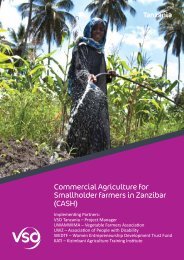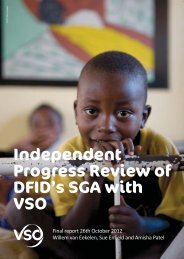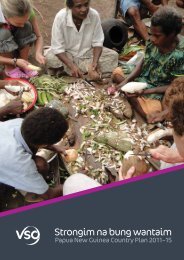VSO and Climate Change
VSO and Climate Change
VSO and Climate Change
You also want an ePaper? Increase the reach of your titles
YUMPU automatically turns print PDFs into web optimized ePapers that Google loves.
<strong>VSO</strong> <strong>and</strong> <strong>Climate</strong> <strong>Change</strong><br />
©<strong>VSO</strong>/Simon Rawles<br />
<strong>VSO</strong> <strong>and</strong><br />
<strong>Climate</strong> <strong>Change</strong><br />
1
<strong>VSO</strong> <strong>and</strong> <strong>Climate</strong> <strong>Change</strong><br />
Contents<br />
Introduction 1<br />
Our vision for action on climate change 2<br />
<strong>VSO</strong>’s approach to climate change work 3<br />
Focusing on the poor, marginalized <strong>and</strong> vulnerable 3<br />
Building adaptive capacity to climate change at the community level 3<br />
Community-based adaptation 3<br />
Working with government 4<br />
Low carbon development 4<br />
Reducing deforestation 4<br />
Disaster risk reduction 4<br />
Integrating climate change into existing programmes 5<br />
Committing to gender sensitivity, gender equity, <strong>and</strong> gender equality 6<br />
Bringing people together 6<br />
Where we will see change 7<br />
Strengthened communities 7<br />
Empowered <strong>and</strong> effective partners 7<br />
Enlightened government policy <strong>and</strong> action 8<br />
A strong <strong>and</strong> responsible <strong>VSO</strong> 8<br />
Case study: Nigeria, climate change <strong>and</strong> <strong>VSO</strong> 9<br />
Case study: Addressing climate change impacts in Bangladesh 9<br />
Case study: Community-based adaptation in Kenya 10<br />
Glossary 11<br />
Key sources 12<br />
2
<strong>VSO</strong> <strong>and</strong> <strong>Climate</strong> <strong>Change</strong><br />
Introduction<br />
Human-induced climatic change is happening now. The scientific evidence for both<br />
past <strong>and</strong> current climate change is unequivocal. <strong>Climate</strong> models predict a future<br />
world which is warmer <strong>and</strong> it is very likely that the changes in the 21st century will<br />
be greater than those which took place in the 20th. Tragically, it is the poorest <strong>and</strong><br />
most vulnerable people, communities <strong>and</strong> countries who bear the brunt of climate<br />
change impacts. This is not surprising, since vulnerabilities caused by climate change<br />
compound vulnerabilities that exist already due to poverty, food insecurity, degraded<br />
natural resources, gender inequity, <strong>and</strong> disability.<br />
Many of the impacts of future climate change are likely to be<br />
devastating for populations in the developing world. Sea level<br />
rise is eroding coastlines, inundating fresh water sources <strong>and</strong><br />
soils with salt water, <strong>and</strong> swallowing l<strong>and</strong> in low-lying areas.<br />
Entire nations in the South Pacific, such as Vanuatu, Tuvalu,<br />
<strong>and</strong> the Cook Isl<strong>and</strong>s, are at risk from l<strong>and</strong> loss <strong>and</strong> degradation<br />
under rising sea levels. Precipitation patterns are predicted to<br />
change, potentially making agriculturally-vital seasonal patterns<br />
less predictable. In some cases when rains do arrive they are<br />
likely to do so with much greater intensity. Likewise dry periods<br />
are likely to increase in severity <strong>and</strong> frequency. More frequent<br />
<strong>and</strong> more intense storms will lead to more devastating floods,<br />
such as those experienced over the past few years in<br />
Bangladesh, Pakistan, Mozambique, Brazil, Honduras, <strong>and</strong><br />
elsewhere. Many arid <strong>and</strong> semi-arid areas, notably the Middle<br />
East <strong>and</strong> the Sahel region of Africa, are getting hotter <strong>and</strong> drier,<br />
resulting in direct impacts on already-compromised food<br />
security <strong>and</strong> indirect impacts on human health <strong>and</strong> security.<br />
Though the consequences are already serious for many, a lot<br />
can be done to ensure that both the scale of the changes <strong>and</strong><br />
their impact on people <strong>and</strong> ecosystems are minimized.<br />
Humanity still has a choice to experience a lot of climate<br />
change or a little climate change, based on the amount of<br />
greenhouse gases we collectively emit, <strong>and</strong> every country must<br />
take responsibility <strong>and</strong> act to ensure that we confront this<br />
global challenge. Those with the highest emissions will need<br />
to reduce them significantly, those with resources will have to<br />
assist others in their efforts, <strong>and</strong> all will have to ensure that<br />
the poorest <strong>and</strong> most vulnerable people get the support that<br />
they require to adapt to the changes they face. In other words,<br />
global cooperation of a kind <strong>and</strong> on a scale never seen before<br />
will have to emerge in order to tackle this challenge head on.<br />
<strong>VSO</strong> will play a role in facing this challenge, by assisting those<br />
most vulnerable to climate change. <strong>VSO</strong> <strong>and</strong> <strong>Climate</strong> <strong>Change</strong><br />
outlines the vision, principles, <strong>and</strong> approach to our work,<br />
helping communities to be less vulnerable <strong>and</strong> more adaptive<br />
to climatic changes that are happening now <strong>and</strong> predicted to<br />
get worse over the coming decades.<br />
The first section lays out <strong>VSO</strong>’s vision for a world where those<br />
who are most at risk are supported to overcome their<br />
vulnerabilities, where those who are most responsible for the<br />
problem do their fair share, <strong>and</strong> where <strong>VSO</strong> plays a meaningful<br />
role in implementing solutions. The second section describes<br />
<strong>VSO</strong>’s approach to climate change work, in terms of target<br />
populations, our method of developing programmes, the<br />
priority activities to be undertaken, <strong>and</strong> the tools that allow<br />
<strong>VSO</strong> to use its strengths <strong>and</strong> contribute its expertise. The final<br />
section explains where we want <strong>and</strong> expect to see change—in<br />
people, partners, <strong>and</strong> government policies as well as within<br />
<strong>VSO</strong> itself.<br />
1
<strong>VSO</strong> <strong>and</strong> <strong>Climate</strong> <strong>Change</strong><br />
Our vision for action<br />
on climate change<br />
<strong>VSO</strong>’s vision is that of a world where all people, especially the poor <strong>and</strong><br />
marginalized, are able to fulfill their fundamental human rights to health,<br />
well-being, <strong>and</strong> security, despite facing hazards from climate change. This means that<br />
communities everywhere have the resilience to withst<strong>and</strong> climate change impacts<br />
over the short term <strong>and</strong> the capacity to adapt to increasing or changing hazards <strong>and</strong><br />
impacts over the longer term. Necessary actions to realize this vision include not only<br />
the provision of resources—social, financial, <strong>and</strong> technological—to communities at<br />
the forefront of climate change impacts, but also efforts that contribute to a dramatic<br />
reduction in the emissions that cause climate change.<br />
Assisting communities in building resilience <strong>and</strong> adaptive<br />
capacity in the face of climate change is not sufficient. Many in<br />
the developing world live in poverty <strong>and</strong> have no or inadequate<br />
access to energy resources. These people have the right to<br />
social <strong>and</strong> economic development, including a sufficient supply<br />
of energy. These new energy sources, however, need to use<br />
technologies that do not add significantly to increased<br />
greenhouse gas emissions in the atmosphere. Otherwise,<br />
paradoxically, widespread energy development risks making<br />
the challenge of climate change even greater <strong>and</strong> the plight of<br />
the poor even worse.<br />
Those with a high st<strong>and</strong>ard of living have an important,<br />
historical responsibility to uphold since their infrastructure<br />
development <strong>and</strong> accumulation of wealth were achieved by<br />
overloading the atmosphere with greenhouse gases that cause<br />
climate change. Countries with the highest per capita<br />
emissions must therefore take the lead in reducing them.<br />
Industrialized countries also have the responsibility—<strong>and</strong> have<br />
made so-far unrealized commitments—to provide resources for<br />
the poor <strong>and</strong> vulnerable to adapt to the growing impacts of<br />
climate change <strong>and</strong> to develop sustainable energy<br />
technologies.<br />
<strong>VSO</strong> will contribute meaningfully to this vision. We will<br />
ensure that development activities we undertake today do not<br />
inadvertently make communities more vulnerable to climate<br />
change impacts tomorrow. Instead, <strong>VSO</strong> will enable climate<br />
change considerations, present <strong>and</strong> future, to be integrated<br />
into our programmes.<br />
<strong>VSO</strong> will continue to work with <strong>and</strong> through partners to build<br />
the capacity of those most in need so they are able to face<br />
their challenges <strong>and</strong> overcome barriers st<strong>and</strong>ing between<br />
them <strong>and</strong> social <strong>and</strong> economic security. We will use a<br />
gender-sensitive approach to strive for gender equity <strong>and</strong><br />
equality in our efforts. And we will build global awareness of<br />
the challenges of climate change, the responsibilities that we<br />
all hold, <strong>and</strong> the solutions that are available.<br />
Finally, <strong>VSO</strong> will take responsibility for its contribution to global<br />
climate change. As an organization with a large staff <strong>and</strong> many<br />
offices <strong>and</strong> one that relies on volunteers, staff, <strong>and</strong> partners to<br />
travel extensively, our ecological footprint will be tangibly <strong>and</strong><br />
convincingly addressed.<br />
©<strong>VSO</strong>/Simon Rawles<br />
2
<strong>VSO</strong> <strong>and</strong> <strong>Climate</strong> <strong>Change</strong><br />
<strong>VSO</strong>’s approach to<br />
climate change work<br />
In many ways, <strong>VSO</strong>’s efforts to address climate change will be very similar to<br />
our existing development work. The values <strong>and</strong> principles that guide our work, the<br />
expertise that the organization has gained, <strong>and</strong> the tools that we rely upon will all be<br />
used to help tackle this new challenge.<br />
Focusing on the poor, marginalized<br />
<strong>and</strong> vulnerable<br />
<strong>VSO</strong>’s overarching goal is to eradicate poverty. The challenge<br />
that climate change presents is that its impact is felt most by<br />
those who are already poor <strong>and</strong> marginalized. For example, the<br />
rural poor live in environments of marginal natural resources<br />
that are most susceptible to the impacts of climate change.<br />
When human health is impacted by climate change-induced<br />
heat stress or a higher incidence of certain diseases, the poor<br />
<strong>and</strong> marginalized are least able to obtain the health services<br />
needed for their well-being <strong>and</strong> have very little influence over<br />
the way they are provided. When extreme weather events<br />
occur, the poor are more likely to be living in areas prone to<br />
flooding or drought <strong>and</strong> are less likely to have adequate<br />
resources to recover from these events.<br />
This is why the work that <strong>VSO</strong> undertakes will target<br />
individuals <strong>and</strong> communities that are already the most<br />
vulnerable. In different contexts, individuals who may be most<br />
vulnerable include women, children <strong>and</strong> youth, people with<br />
disabilities, ethnic minorities, <strong>and</strong> people living with HIV <strong>and</strong><br />
AIDS. Their vulnerability can stem from not having access to<br />
decision-making or to resources that others in society do, or<br />
because they are excluded in other ways. Vulnerability can also<br />
exist at the community level due to inadequate access to water,<br />
infertile agricultural soils, or poor infrastructure such as schools<br />
<strong>and</strong> roads.<br />
A participatory <strong>and</strong> inclusive approach is necessary to identify<br />
<strong>and</strong> target the poorest <strong>and</strong> most vulnerable. At every stage of<br />
project development—analysis, design, implementation, <strong>and</strong><br />
monitoring <strong>and</strong> evaluation—<strong>VSO</strong> <strong>and</strong> its partners will use<br />
approaches that explicitly seek out <strong>and</strong> integrate the views <strong>and</strong><br />
experiences of those who are most vulnerable. This will ensure<br />
that the issues faced by individuals <strong>and</strong> communities are well<br />
understood <strong>and</strong> that solutions that are developed will be<br />
appropriate <strong>and</strong> effective.<br />
Building adaptive capacity to climate<br />
change at the community level<br />
Every developing country has significant challenges in<br />
adapting to climate change <strong>and</strong> there are many activities<br />
that can be undertaken to help address those challenges.<br />
Programmes will be driven by country needs <strong>and</strong> partner<br />
priorities. Priorities will be identified through analysis that uses<br />
high-level science <strong>and</strong> policy, such as country-wide vulnerability<br />
assessments or national adaptation strategies, informed by<br />
community-based, participatory approaches that incorporate<br />
local knowledge of how the local climate has changed, what<br />
vulnerabilities exist at the local level, <strong>and</strong> what are the<br />
potential solutions.<br />
Many of <strong>VSO</strong>’s climate change programmes will be developed<br />
in one country alone through its programme office. However,<br />
common climate change issues <strong>and</strong> concerns exist across<br />
regions <strong>and</strong>, as such, regional initiatives are being developed<br />
by governments <strong>and</strong> civil society organizations, for example<br />
in Southeast Asia <strong>and</strong> Central America. As appropriate <strong>and</strong><br />
strategic, <strong>VSO</strong> will contribute to existing regional processes or<br />
develop our own regional initiatives.<br />
Community-based adaptation<br />
<strong>VSO</strong>’s priority will be to work on community-based adaptation,<br />
work whose primary objective is to improve the capacity of<br />
local communities to adapt to climate change impacts.<br />
This community-level work builds on <strong>VSO</strong>’s experience <strong>and</strong><br />
strengths in assessing <strong>and</strong> working to reduce vulnerability.<br />
Focusing on adaptation is an explicit recognition that those<br />
in the developing world, <strong>and</strong> especially the poorest <strong>and</strong> most<br />
vulnerable, face tremendous challenges in responding to the<br />
escalating impacts of climate change.<br />
It is clear that climate change has impacts across a wide range<br />
of development issues (see section below: Integrating climate<br />
change into existing programmes). However, there are certain<br />
areas of <strong>VSO</strong>’s work where vulnerabilities are already<br />
3
<strong>VSO</strong> <strong>and</strong> <strong>Climate</strong> <strong>Change</strong><br />
significant <strong>and</strong> urgency is warranted. For example, water<br />
availability is a challenge in many regions <strong>and</strong> predicted to get<br />
worse due to a hotter, drier climate or less predictable rainfall.<br />
Food security is a long-st<strong>and</strong>ing challenge in the developing<br />
world <strong>and</strong> one that is exacerbated by climate change. And<br />
climate change is having impacts on biodiversity <strong>and</strong> the<br />
management of natural resources, including forests, especially<br />
for populations dependent on them.<br />
Working with government<br />
A second priority will be to partner with <strong>and</strong> advocate to<br />
in-country government agencies. Though the beneficiaries of<br />
our work will be those at the community level, <strong>VSO</strong> has shown<br />
in the past that real <strong>and</strong> sustainable change can best be<br />
accomplished through work that is multi-faceted <strong>and</strong> occurs at<br />
different political scales within a country. National, state <strong>and</strong><br />
local government are usually best placed to overcome systemic<br />
challenges related to climate change, so it will be important in<br />
some cases to work with government.<br />
This will involve two main activities. The first will be working<br />
directly with government, either by having a volunteer placed<br />
within a government agency or having volunteers participate in<br />
<strong>and</strong> support policy development or implementation. The latter<br />
could be through an advisory committee or stakeholder group<br />
or some other institutional body that gives guidance to<br />
government agencies.<br />
Second, <strong>VSO</strong> will also aim to build the capacity of local partners<br />
such as non-governmental organizations (NGOs) or community<br />
groups to advocate for climate change policy development or<br />
implementation. Local representatives, if well supported <strong>and</strong><br />
empowered with the necessary skills <strong>and</strong> knowledge, can often<br />
be the most effective advocates with local, state <strong>and</strong> national<br />
governments for the needs of the community. <strong>VSO</strong> will<br />
contribute to this support through, for example, the placement<br />
of research or advocacy volunteers, funding for the production<br />
of evidence, or knowledge sharing from other regions<br />
or countries.<br />
Low carbon development<br />
Other activities, such as the development of sustainable energy<br />
technologies, also called low carbon development, may also be<br />
undertaken by programme offices with interest <strong>and</strong> expertise.<br />
The focus of sustainable energy development will be to provide<br />
(more secure) energy resources to those who presently do not<br />
have access to them, thus ensuring that benefits reach<br />
those most in need. In most cases, therefore, the intent of<br />
developing sustainable energy sources will not be to replace<br />
existing, higher emitting energy sources (often called<br />
mitigation, since it involves a reduction in greenhouse gas<br />
emissions) but rather contributing energy resources towards<br />
the goal of social <strong>and</strong> economic development. Mitigation<br />
should be a much lower priority for poor people in the<br />
developing world, whose emissions are already very low <strong>and</strong><br />
therefore make virtually no contribution to the problem of<br />
climate change.<br />
Reducing deforestation<br />
Activities that strive to reduce deforestation <strong>and</strong> otherwise<br />
preserve biodiversity may also be undertaken by <strong>VSO</strong> as<br />
adaptive measures. For communities that depend upon the<br />
services provided by forests <strong>and</strong> other ecosystems, their<br />
preservation is essential <strong>and</strong> a key factor in building those<br />
communities’ adaptive capacity. These projects, whether or not<br />
they generate credits or revenue, must be participatory <strong>and</strong><br />
transparent <strong>and</strong> benefit the poor. Community members need<br />
to have a say in how the project is undertaken <strong>and</strong> the rights of<br />
indigenous peoples <strong>and</strong> forest communities must be preserved.<br />
Disaster risk reduction<br />
Disaster risk reduction may also be a goal undertaken by <strong>VSO</strong><br />
programme offices to assist communities in becoming less<br />
vulnerable to climate change. Disaster risk reduction involves<br />
supporting communities to prepare in advance for impacts<br />
that are specific to extreme weather events <strong>and</strong> implementing<br />
mechanisms to reduce those vulnerabilities. In some cases, this<br />
will involve building physical infrastructure such as shelters that<br />
people can go to in the event of floods, l<strong>and</strong>slides, or storm<br />
surges. It may also involve developing early warning systems so<br />
people know that storms or floods are coming.<br />
4
<strong>VSO</strong> <strong>and</strong> <strong>Climate</strong> <strong>Change</strong><br />
Integrating climate change into<br />
existing programmes<br />
<strong>VSO</strong> has a number of existing thematic areas of work <strong>and</strong><br />
climate change has the potential to undermine progress in<br />
each of them. For example, climate change hazards add further<br />
complexity to the range of factors that create vulnerability for<br />
poor people’s livelihoods, particularly those dependent upon<br />
agriculture <strong>and</strong> natural resources. Higher <strong>and</strong> more variable<br />
temperatures, less predictability in precipitation patterns, the<br />
potential for more frequent <strong>and</strong> intense storms <strong>and</strong>/or drought<br />
in some geographical regions are disrupting agricultural<br />
production <strong>and</strong> other livelihoods activities, exacerbating<br />
poverty <strong>and</strong> hunger—unless communities are able to access<br />
support required to adapt to the changing climate. Increased<br />
competition for scarce water resources can also aggravate<br />
other tensions within or between communities, potentially<br />
leading to violence <strong>and</strong> insecurity.<br />
<strong>Climate</strong> change also has direct <strong>and</strong> indirect impacts on human<br />
health, such as an increase in vector- <strong>and</strong> water-borne diseases<br />
due to changes in the amount or intensity of precipitation,<br />
kidney disease due to heat stress <strong>and</strong> lack of water resources,<br />
<strong>and</strong> malnutrition due to loss of agricultural crops.<br />
<strong>Climate</strong> change also increases vulnerability to HIV <strong>and</strong> AIDS.<br />
Food insecurity, one of the impacts of climate change, can lead<br />
people into risky survival activities. They may migrate to find<br />
food; they may scavenge markets <strong>and</strong> industrial sites for food<br />
<strong>and</strong> risk falling prey to sexual dem<strong>and</strong>s; they may exchange sex<br />
for money or food; <strong>and</strong> children may be taken out of school<br />
prematurely to gather food or to work. In the case of girls, early<br />
marriages may be entered into to reduce the burden on a<br />
family or boost household income. For people already living<br />
with HIV, good nutrition is essential to slow the progress of<br />
illness, increase effectiveness of antiretroviral drugs <strong>and</strong> allow<br />
for greater resistance to opportunistic infections.<br />
People living with disabilities can be particularly hard hit by<br />
climate change for several reasons. Disability <strong>and</strong> poverty<br />
are closely linked, <strong>and</strong> poverty is a significant contributor to<br />
vulnerability from climate change. People with disabilities also<br />
experience exclusion from services, including those related to<br />
climate change impacts, because they are not provided in a<br />
way that is accessible to that group. More specifically, people<br />
living with disabilities (<strong>and</strong> HIV/AIDS) that restrict mobility are<br />
also more vulnerable to climate-related disasters such as storm<br />
surges or flooding that displace individuals or communities<br />
<strong>and</strong> that are becoming more frequent in many places due to<br />
climate change.<br />
School programs can be disrupted by natural disasters, since<br />
schools are often used as shelters when climate-related<br />
disasters strike. Educational objectives can be compromised<br />
by food insecurity <strong>and</strong> poor nutrition in children. Educational<br />
retention <strong>and</strong> attendance rates are also adversely affected<br />
when children have to spend a large part of their day collecting<br />
water or working in the fields, or compensating in some way<br />
for adverse climate change effects. However, both formal <strong>and</strong><br />
informal education can play an important role in raising<br />
awareness of the causes of <strong>and</strong> solutions to climate change.<br />
The school environment <strong>and</strong> a flexible approach to the<br />
curriculum can be used as an opportunity for increased<br />
interactive learning on climate change issues.<br />
Active citizenship, the participation of communities <strong>and</strong><br />
citizens in decision-making on climate change programmes <strong>and</strong><br />
policies, can ensure those decisions help to build the<br />
adaptive capacity of communities dealing with climate change<br />
<strong>and</strong> better support the poorest <strong>and</strong> most vulnerable people<br />
within those communities. The same is true of good<br />
governance of civil society organizations <strong>and</strong> governments.<br />
The reverse is true as well, that a lack of inclusion in decisionmaking<br />
<strong>and</strong> poor governance at the community level <strong>and</strong> in<br />
government can add to individual <strong>and</strong> community<br />
vulnerabilities.<br />
Because of this connection to <strong>VSO</strong>’s existing thematic<br />
activities, many programme offices will focus on integrating<br />
climate change into their existing programmes. In many ways,<br />
this will be a continuation of <strong>VSO</strong>’s existing work, while adding<br />
a “climate change lens” to project development by, for<br />
example, including climate change-induced vulnerabilities.<br />
Existing tools will be used to assist <strong>VSO</strong> <strong>and</strong> its partners in<br />
undertaking this integration. Some programme offices, for<br />
strategic reasons, will undertake programmes that are specific<br />
to climate change <strong>and</strong> that are labeled as such.<br />
The relative importance of climate change to each programme<br />
area will vary based on social, economic <strong>and</strong> ecological<br />
considerations. Programme offices <strong>and</strong> project proponents will<br />
determine the relevance of climate change to the work <strong>and</strong><br />
what actions are necessary to integrate those considerations<br />
into the work.<br />
5
<strong>VSO</strong> <strong>and</strong> <strong>Climate</strong> <strong>Change</strong><br />
Committing to gender sensitivity,<br />
gender equity, <strong>and</strong> gender equality<br />
<strong>Climate</strong> change affects men <strong>and</strong> women differently, because<br />
of socio-cultural differences in gender roles <strong>and</strong> the differing<br />
access to resources, including l<strong>and</strong>, money, credit, education<br />
<strong>and</strong> training. <strong>Climate</strong> change can often magnify gender<br />
inequalities by exacerbating existing differences between men<br />
<strong>and</strong> women in their vulnerability <strong>and</strong> their ability to cope. Men<br />
<strong>and</strong> women will also be affected differently <strong>and</strong> will respond<br />
differently to climate change policies, programmes <strong>and</strong><br />
projects. For example, early warning systems that are<br />
intended to alert communities of an oncoming flood may use<br />
technologies that are not accessible by women. Programmes<br />
that attempt to make livelihoods more resilient may target<br />
economic activities that are dominated by men.<br />
For these reasons <strong>VSO</strong>’s climate change work will be gender<br />
sensitive <strong>and</strong> strive for gender equity <strong>and</strong> equality. That is, it<br />
will recognize the important differences between women <strong>and</strong><br />
men <strong>and</strong> take these differences into account when climate<br />
change interventions are designed <strong>and</strong> implemented. The<br />
success of climate change programming that is able to target<br />
the poorest <strong>and</strong> most vulnerable requires a solid underst<strong>and</strong>ing<br />
of gender roles, the varying impacts of climate change in regard<br />
to gender, <strong>and</strong> the differing access to social, economic <strong>and</strong><br />
environmental resources by men <strong>and</strong> women. Success also<br />
depends on the meaningful participation of both women<br />
<strong>and</strong> men.<br />
<strong>VSO</strong> is committed to gender equity <strong>and</strong> equality in the design,<br />
delivery, <strong>and</strong> outcomes of climate change-related projects,<br />
<strong>and</strong> to undertaking campaigns for greater gender equity<br />
<strong>and</strong> equality <strong>and</strong> the enhanced participation of women in<br />
discussions related to climate change <strong>and</strong> development.<br />
Bringing people together<br />
<strong>VSO</strong>’s effectiveness rests on its ability to bring people together<br />
to share <strong>and</strong> exchange ideas, experiences, expertise, <strong>and</strong><br />
perspectives. Our work on climate change is no different.<br />
One of <strong>VSO</strong>’s primary approaches to international development<br />
is sending volunteers. Currently, <strong>VSO</strong> volunteers have<br />
been effective at contributing their expertise to increase<br />
communities’ capacity to adapt to climatic change impacts<br />
in countries such as Nigeria, Kenya, <strong>and</strong> Bangladesh (see<br />
case studies below). International volunteers will continue to<br />
collaborate with partners <strong>and</strong> local communities to assist them<br />
in their adaptation efforts.<br />
Where appropriate, there will also be a role for national<br />
volunteers in climate change-related programmes. National<br />
volunteering refers to <strong>VSO</strong>’s inclusion of people volunteering<br />
within their own countries, e.g. Bangladeshis volunteering in<br />
Bangladesh. National volunteers, given their knowledge <strong>and</strong><br />
underst<strong>and</strong>ing of local language <strong>and</strong> culture, can be invaluable<br />
in undertaking community-based adaptation work. National<br />
volunteers can be particularly valuable in awareness raising<br />
campaigns, since they can have a better appreciation for the<br />
methods of communication that would be effective, <strong>and</strong> since<br />
they are often youth who have a lot of energy <strong>and</strong> passion for<br />
environmental issues.<br />
Diaspora volunteering can also be a powerful tool that can<br />
be used for climate change-relevant projects. Similar to<br />
national volunteering, Diaspora volunteers can bring cultural<br />
knowledge to climate change adaptation work. Diaspora<br />
volunteers may also be able to play an important advocacy<br />
role upon return to their adopted countries, communicating<br />
to their communities <strong>and</strong> to governments the importance of<br />
industrialized countries contributing to climate change efforts<br />
in the developing world. Similarly, south-north visits can bring<br />
the experiences <strong>and</strong> perspectives of those living with climate<br />
change in the developing world to citizens <strong>and</strong> governments in<br />
the industrialized world.<br />
<strong>VSO</strong> will also continue to explore knowledge partnerships<br />
with universities <strong>and</strong> researchers who can bring academic<br />
expertise on climate change science <strong>and</strong> adaptation practices.<br />
This knowledge <strong>and</strong> experience will be important inputs to<br />
the development of forward-looking adaptation strategies.<br />
Knowledge partnerships can also happen in the field, with<br />
practitioners from NGOs who have a long history of applied<br />
experience in this field.<br />
©<strong>VSO</strong>/Ben Langdon<br />
Finally, <strong>VSO</strong> will bring people together in other ways to<br />
exchange information about, perspectives on, <strong>and</strong> lessons from<br />
climate change, including knowledge sharing initiatives, study<br />
tours of climate-related work <strong>and</strong> different types of exchanges:<br />
north-south, south-north, <strong>and</strong> south-south.<br />
6
<strong>VSO</strong> <strong>and</strong> <strong>Climate</strong> <strong>Change</strong><br />
Where we will<br />
see change<br />
Strengthened communities<br />
The aim of <strong>VSO</strong>’s community-based adaptation work is to bring<br />
multiple benefits to individuals <strong>and</strong> communities, especially<br />
those who are marginalized <strong>and</strong> most vulnerable to the<br />
impacts of climate change. Communities will have greater<br />
resilience so they can absorb <strong>and</strong> recover from climate change<br />
impacts as they occur.<br />
More importantly, communities will also build their capacity<br />
to respond to ongoing climate changes that will require<br />
adaptation across many sectors <strong>and</strong> over time. Communities<br />
will be able to look ahead <strong>and</strong> modify their behaviour in order<br />
to be better prepared <strong>and</strong> less vulnerable to climate change<br />
impacts, even as they intensify. Adopting a long-term approach<br />
to climate change is needed to move beyond short-term coping<br />
strategies to ongoing adaptation actions.<br />
All of this will be facilitated by public engagement/sensitization<br />
campaigns that will be undertaken as part of climaterelated<br />
projects. Community members will be able make<br />
the connection between the changes they experience <strong>and</strong><br />
the impacts predicted by climate change science. Increased<br />
awareness will also help them underst<strong>and</strong> that climate change<br />
impacts are unlikely to go away, so that waiting for the climate<br />
to “go back” to the way it was is not an option. With this<br />
underst<strong>and</strong>ing will come greater buy-in from the community,<br />
improved skills to foresee <strong>and</strong> prepare for future climatic<br />
changes, <strong>and</strong> an ability to become more effective advocates<br />
for the policies <strong>and</strong> resources needed from local <strong>and</strong> national<br />
governments <strong>and</strong> other stakeholders.<br />
Empowered <strong>and</strong> effective partners<br />
Collaborative <strong>and</strong> strategic partnerships that address climate<br />
change will allow both <strong>VSO</strong> <strong>and</strong> its partners to learn from<br />
one another <strong>and</strong> build their knowledge <strong>and</strong> capacity to work<br />
on climate change-related projects. Partners will benefit<br />
from learning opportunities related to climate change such<br />
as training sessions, workshops, study tours, <strong>and</strong> action<br />
research—learning by doing.<br />
work on community-based adaptation will become proficient<br />
at integrating climate change into development projects <strong>and</strong><br />
mainstreaming gender into climate-related projects.<br />
Second, <strong>VSO</strong> partners will also build their skills <strong>and</strong> capacity in<br />
developing <strong>and</strong> implementing research, advocacy, <strong>and</strong> public<br />
engagement campaigns on climate change. Partners need<br />
specific skills on policy development <strong>and</strong> lobbying in order to<br />
engage with decision makers, <strong>and</strong> need communications skills<br />
to carry out public engagement activities on climate change at<br />
the community level.<br />
Other international NGOs who already have experience<br />
<strong>and</strong> expertise working on climate change adaptation could<br />
also benefit from partnerships with <strong>VSO</strong>. These strategic<br />
partnerships would combine the strengths of partner<br />
organizations to increase the effectiveness of adaptation work.<br />
<strong>VSO</strong> can build its skills on climate change adaptation while also<br />
contributing its vast experience in community-based projects,<br />
capacity building at the local level, <strong>and</strong> the use of volunteers.<br />
Partnerships between NGOs <strong>and</strong> within networks or consortia<br />
are increasingly being viewed favourably by institutional<br />
funders.<br />
Finally, local, state <strong>and</strong> national governments can build their<br />
capacity to implement climate change strategies at the local<br />
level. By working with <strong>VSO</strong>, governments will have a greater<br />
underst<strong>and</strong>ing of how programmes <strong>and</strong> policies can be<br />
implemented so they benefit those most in need. They can also<br />
learn from joint pilot projects undertaken with <strong>VSO</strong> in order<br />
to effectively scale up their programmes <strong>and</strong> policies to other<br />
communities, across states, or nationally<br />
Capacity development within partners is already happening<br />
in areas related to service delivery, financial management,<br />
strategic planning, monitoring <strong>and</strong> evaluation, <strong>and</strong> other skills.<br />
Partners will build their capacity within two additional areas<br />
related to climate change. First, partner organizations who<br />
7
<strong>VSO</strong> <strong>and</strong> <strong>Climate</strong> <strong>Change</strong><br />
Enlightened government policy<br />
<strong>and</strong> action<br />
Systematic <strong>and</strong> widespread adaptation to climate change<br />
requires governments to develop <strong>and</strong> implement national<br />
plans <strong>and</strong> policies. Without this, progress to build adaptive<br />
capacity at the community level risks being piecemeal <strong>and</strong><br />
unsustainable. With national policies <strong>and</strong> plans, governments<br />
will be better able to access <strong>and</strong> coordinate available<br />
international funding <strong>and</strong> reallocate internal resources to<br />
address climate change priorities. Therefore, <strong>VSO</strong> will provide<br />
support to partners to develop in-country advocacy strategies.<br />
Targeted <strong>and</strong> proactive advocacy undertaken by <strong>VSO</strong> partners<br />
will engage governments to develop <strong>and</strong> implement pro-poor<br />
climate change policies.<br />
However, government policies <strong>and</strong> plans are not sufficient.<br />
They also need to be implemented. <strong>VSO</strong> partners will strive<br />
to play an important role in advocating to <strong>and</strong> supporting<br />
governments’ implementation of climate change programs<br />
to ensure resources <strong>and</strong> actions get to those who most need<br />
them at the community level.<br />
<strong>Change</strong>s in national policies are needed in the industrialized<br />
world as well. As <strong>VSO</strong> builds its expertise on climate change,<br />
it will be able to speak from experience about the need for<br />
strong policies <strong>and</strong> action on climate change <strong>and</strong> share stories<br />
about how to make communities in the developing world<br />
more secure <strong>and</strong> resilient. A number of different advocacy<br />
initiatives—often by <strong>VSO</strong> in coalition with other networks, or<br />
through Diaspora <strong>and</strong> returned volunteers—will try to compel<br />
governments in the global North to implement policies <strong>and</strong><br />
measures that reduce their emissions of greenhouse gases<br />
<strong>and</strong> support the efforts of those in the developing world in<br />
adaptation, mitigation, <strong>and</strong> low carbon energy development.<br />
There may also be strategic opportunities to engage in<br />
regional or international policy discussions or, in the future,<br />
to undertake a global campaign as an organization. However,<br />
these should be undertaken only where <strong>VSO</strong> has a niche<br />
that allows both access <strong>and</strong> influence, <strong>and</strong> could therefore<br />
have an impact on the outcome. Returned volunteers can be<br />
encouraged to support international advocacy campaigns that<br />
are undertaken by <strong>VSO</strong> or other international development<br />
organizations doing climate change advocacy.<br />
A strong <strong>and</strong> responsible <strong>VSO</strong><br />
<strong>Change</strong> will happen within <strong>VSO</strong> as well. It will be clear from our<br />
programmes, communications, <strong>and</strong> day-to-day office policies<br />
<strong>and</strong> procedures that climate change has been adopted as a<br />
key priority. Efforts will be taken to clearly communicate the<br />
importance of <strong>VSO</strong>’s climate change work, especially since<br />
many interventions will be integrating climate change into<br />
programme goal areas rather than developing programmes<br />
that carry the climate change label. Stakeholders <strong>and</strong> the<br />
general public must come to underst<strong>and</strong> that climate change<br />
work is an important part of <strong>VSO</strong>’s activities.<br />
<strong>VSO</strong> will also build its knowledge <strong>and</strong> capacity on issues related<br />
to climate change. This will include hiring staff that have that<br />
expertise as well as providing training <strong>and</strong> resources to existing<br />
staff <strong>and</strong> volunteers. Expertise will be built in areas related to<br />
climate change impacts in countries where we operate, the<br />
design <strong>and</strong> implementation of community-based, gendersensitive<br />
adaptation projects, including the use of relevant<br />
toolkits, <strong>and</strong> the development of public engagement initiatives.<br />
<strong>VSO</strong> will also take responsibility for its impact on the<br />
environment <strong>and</strong>, specifically, its contribution to climate<br />
change in a more comprehensive way. We will measure our<br />
ecological footprint <strong>and</strong> build on environmental initiatives<br />
already undertaken by implementing policies to reduce that<br />
footprint across the organization, reflecting our concern for<br />
those most vulnerable to the impacts of climate change.<br />
Various strategies will be used. <strong>VSO</strong> will build on the office<br />
policies already implemented across the federation to further<br />
reduce the use of energy <strong>and</strong> resources. We will investigate<br />
opportunities to develop <strong>and</strong> use sustainable sources of<br />
energy. We will undertake an analysis to identify strategies<br />
that will reduce staff, volunteer, <strong>and</strong> partner travel, including<br />
commuting. Initiatives could include building our national<br />
volunteering programme (which is already providing volunteers<br />
at lower environmental costs), exp<strong>and</strong>ing green travel policies<br />
already in place in London, <strong>and</strong> developing an e-volunteering<br />
programme. Finally, we will explore options for using highquality<br />
offsets for those greenhouse gas emissions that cannot<br />
be reduced.<br />
8
<strong>VSO</strong> <strong>and</strong> <strong>Climate</strong> <strong>Change</strong><br />
Case study:<br />
Nigeria, climate change <strong>and</strong> <strong>VSO</strong><br />
One of the only programmes that <strong>VSO</strong> has undertaken to<br />
date that explicitly focuses on climate change is Building<br />
Nigeria’s Response to <strong>Climate</strong> <strong>Change</strong> (BNRCC), a partnership<br />
between CUSO-<strong>VSO</strong> (the North American federation member<br />
of <strong>VSO</strong>), Marbek (a Canadian consulting firm), <strong>and</strong> the Nigerian<br />
Environmental Study/Action Team or NEST (the main NGO<br />
partner in Nigeria). BNRCC, a programme undertaken between<br />
2007 <strong>and</strong> 2011, has different components including academic<br />
research on the socio-economic impact of climate change <strong>and</strong><br />
the application of climate change models to more local scales<br />
in Nigeria; media <strong>and</strong> communications strategies to bring<br />
climate change stories to journalists <strong>and</strong> the general public; a<br />
policy contribution to the development of Nigeria’s national<br />
adaptation strategy; <strong>and</strong> 15 community-based adaptation<br />
projects in different regions of the country.<br />
Every community project in Nigeria has unique challenges,<br />
but there have been common themes. For example, water<br />
availability is currently an important challenge in the semiarid,<br />
central part of Nigeria, <strong>and</strong> even more so in the arid<br />
north. In cooperation with NEST <strong>and</strong> seven local partner<br />
organizations, <strong>VSO</strong> volunteers have supported communities in<br />
becoming less vulnerable to water scarcity. In one community<br />
alone, rooftop water harvesting systems were installed, water<br />
storage tanks were built, water filtration systems were set up,<br />
<strong>and</strong> the capacity of local micro dams was increased. These<br />
interventions brought important benefits to this community,<br />
especially for the women, who are responsible for water<br />
collection <strong>and</strong> previously had to walk long distances to supply<br />
water for their households.<br />
The BNRCC’s community-based projects undertook a number<br />
of other initiatives, all driven by the stated priorities of<br />
community members <strong>and</strong> the vulnerabilities <strong>and</strong> impacts<br />
they were facing. New drought-resistant <strong>and</strong> early-maturing<br />
varieties of sorghum, millet, beans, maize, cassava <strong>and</strong> rice<br />
were introduced to address changing climatic conditions. More<br />
efficient, wood-burning stoves were distributed to women to<br />
decrease wood usage, improve indoor air quality, <strong>and</strong> reduce<br />
cooking times. Alternative livelihoods, such as fish farming,<br />
snail farming, <strong>and</strong> small-scale irrigation, were also developed.<br />
The lessons learned in Nigeria have been shared with the<br />
Ministry through a policy dialogue based on expertise gained<br />
at the grassroots level, <strong>and</strong> this has been able to influence the<br />
development of climate change adaptation policy in Nigeria<br />
at the national level. Lessons are also being shared with other<br />
programme offices <strong>and</strong> their partners in order to inform the<br />
development of their climate change programmes.<br />
Case study:<br />
Addressing climate change<br />
impacts in Bangladesh<br />
Bangladesh faces several hazards related to climate change,<br />
many of them related to water. Significant portions of the<br />
country flood every year due to more intense precipitation<br />
events <strong>and</strong> increased river flows due to melting glaciers in<br />
the Himalayas. Along the coastal belt, sea level rise <strong>and</strong> storm<br />
surges from more frequent typhoons have caused salination of<br />
soils <strong>and</strong> water sources.<br />
These hazards are likely most severe for Bangladesh’s<br />
agriculture sector <strong>and</strong>, with 80% of its citizens dependent on<br />
agriculture for their livelihood, climate change poses major<br />
problems for the country. <strong>VSO</strong>-Bangladesh underst<strong>and</strong>s these<br />
vulnerabilities <strong>and</strong> is working to assist communities be more<br />
adaptive.<br />
Shahana Hayat, country director for Bangladesh puts it<br />
this way:<br />
“People who are already vulnerable <strong>and</strong> food<br />
insecure are likely to be the first affected.<br />
Agriculture-based livelihood systems that<br />
are already vulnerable to food insecurity<br />
face immediate risk of increased crop failure,<br />
new patterns of pests <strong>and</strong> diseases, lack of<br />
appropriate seeds <strong>and</strong> planting material, <strong>and</strong><br />
loss of livestock. People living on the coasts <strong>and</strong><br />
floodplains are most at risk.”<br />
<strong>VSO</strong>-Bangladesh is working to help communities by making<br />
research accessible to smallholder farmers at a local level<br />
through ‘living laboratory’ approaches to action research. The<br />
increased salination of agricultural l<strong>and</strong> is increasing poverty<br />
levels.<br />
Recognizing that local communities need to develop alternative<br />
sources of incomes, in 2010 a <strong>VSO</strong> volunteer worked with<br />
these communities to identify viable options, which included<br />
adapting the cultivation of sweet water fish species to<br />
cultivation in salt water. The volunteer then worked with local<br />
fishermen, youth club members <strong>and</strong> the Fisheries Department<br />
to develop a model of cultivating sweet water fish in the saline<br />
water, which was appropriate to the local context.<br />
Eighty community <strong>and</strong> youth club members have now been<br />
trained on this model <strong>and</strong> are able to pass on skills for fish<br />
cultivation to other communities also affected by salt water<br />
intrusion.<br />
9
<strong>VSO</strong> <strong>and</strong> <strong>Climate</strong> <strong>Change</strong><br />
Case study:<br />
Community-based adaptation in Kenya<br />
<strong>VSO</strong>’s current work in the Kajiado District of southern<br />
Kenya highlights our potential contribution to communitybased<br />
adaptation. Though not labeled “climate change”<br />
the work of the volunteers <strong>and</strong> partners, undertaken since<br />
2009, is community-based adaptation since it is supporting<br />
communities <strong>and</strong> citizens groups to adapt to the increasingly<br />
frequent droughts in this semi-arid region.<br />
<strong>VSO</strong> volunteers are using their skills <strong>and</strong> knowledge to build<br />
capacity in a number of ways in the farming <strong>and</strong> pastoral<br />
communities <strong>and</strong> the partner organizations that support<br />
them. Conservation agriculture—producing high crop<br />
yields while conserving soil fertility—is being used to make<br />
agriculture more productive in the face of hotter, drier<br />
conditions. Fermented fruit juice, made using the stalks of<br />
banana trees, is getting great reviews as a natural fertilizer for<br />
crops. Intercropping traditional crops such as maize with cash<br />
crops like tomatoes has brought multiple benefits: the maize<br />
provides shade for the tomato plants <strong>and</strong> is used as a food<br />
staple, its stalks are fed to cattle, <strong>and</strong> the tomatoes provide a<br />
revenue stream for farmers when sold at the local market.<br />
©<strong>VSO</strong>/Ben Langdon<br />
Nitrogen-fixing trees are being planted alongside agricultural<br />
plots. The nitrogen increases the fertility of the soil <strong>and</strong> the<br />
trees provide shade for the crops during the hot, dry season.<br />
Volunteers are also supporting the introduction of alternative<br />
livelihoods with local community members, including citizens<br />
groups. These include beekeeping <strong>and</strong> honey production;<br />
breeding <strong>and</strong> raising goats; camel herding; <strong>and</strong> fish farming.<br />
Alternative sources of income decrease the vulnerability that<br />
the community faces from more prevalent droughts.<br />
Capacity is also being built within the local partner, a savings<br />
<strong>and</strong> credit co-operative. A <strong>VSO</strong> volunteer has supported the<br />
partner in its strategic planning <strong>and</strong> set up computer systems<br />
<strong>and</strong> a network for its branches, making the co-operative more<br />
efficient <strong>and</strong> effective at providing financial <strong>and</strong> technical<br />
support to its members, mostly farmers <strong>and</strong> pastoralists.<br />
10
<strong>VSO</strong> <strong>and</strong> <strong>Climate</strong> <strong>Change</strong><br />
Glossary<br />
Adaptation: Adjustment in natural or human systems to<br />
moderate the harm or exploit beneficial opportunities<br />
associated with climate change. Adaptation is usually a<br />
longer-term livelihood strategy, as opposed to short-term<br />
coping activity, <strong>and</strong> is a continuous process where results are<br />
sustained.<br />
Adaptive capacity: The potential of individuals, communities,<br />
<strong>and</strong> societies to be actively involved in the processes of<br />
change, to minimize negative impacts <strong>and</strong> maximize any<br />
benefits from changes in the climate.<br />
<strong>Climate</strong> change: Any change in climate over time, whether<br />
due to natural variability or as a result of human activity.<br />
Current global concern is focused on climate change<br />
resulting from human activity, <strong>and</strong> specifically from the<br />
release of carbon dioxide <strong>and</strong> other greenhouse gases to the<br />
atmosphere.<br />
<strong>Climate</strong> change impact: The effect of a climate change hazard<br />
on people or ecosystems, e.g. crop failure, lack of access to<br />
clean water, increased incidence of disease.<br />
<strong>Climate</strong> change vulnerability: The degree to which a system<br />
is susceptible to the adverse effects of climate change.<br />
Vulnerability is a function of the character, magnitude, <strong>and</strong><br />
rate of climate variation to which a system is exposed, <strong>and</strong><br />
that system’s resilience <strong>and</strong> adaptive capacity.<br />
Community-based adaptation: Activities whose primary<br />
objective is to improve the capacity of local communities to<br />
adapt to climatic changes.<br />
Gender equality: A situation where men <strong>and</strong> women have<br />
equal opportunities to realize their individual potential –<br />
both to contribute to their country’s economic <strong>and</strong> social<br />
development, <strong>and</strong> to benefit equally from their participation<br />
in society. Gender equality does not mean that men <strong>and</strong><br />
women will become the same, but rather that the interests<br />
<strong>and</strong> needs of women <strong>and</strong> men are weighed equally, as both<br />
sexes are valued equally.<br />
Gender equity: Being fair to both sexes by recognizing<br />
different needs, interests, <strong>and</strong> power <strong>and</strong> addressing them.<br />
Gender equity asserts that different treatment may be<br />
required for men <strong>and</strong> women, <strong>and</strong> believes in the necessity<br />
of redistributing power based on past disadvantages <strong>and</strong><br />
injustices.<br />
Hazard: An event with the potential to cause harm. Examples<br />
of climate hazards found in the literature include tropical<br />
cyclones, droughts, floods, sea level rise or conditions leading<br />
to an outbreak of disease.<br />
Mitigation: The reduction of greenhouse gas emissions that<br />
cause global climate change.<br />
National volunteering: Encouraging people to underst<strong>and</strong>,<br />
influence, <strong>and</strong> own the development of their own<br />
communities <strong>and</strong> countries through volunteering.<br />
Resilience: The ability of a system (human or natural) to<br />
resist, absorb <strong>and</strong> recover from the effects of hazards in<br />
a timely <strong>and</strong> efficient manner, preserving or restoring its<br />
essential basic structures, functions <strong>and</strong> identity.<br />
Conservation agriculture: Resource-saving agricultural crop<br />
production that strives to achieve acceptable profits together<br />
with high <strong>and</strong> sustained production levels while concurrently<br />
conserving the environment.<br />
Diaspora volunteering: The linking of members of a<br />
Diaspora community with their countries of origin through<br />
volunteering.<br />
Ecological footprint: A measure of the environmental impact,<br />
including greenhouse gas emissions, of an organization<br />
or entity.<br />
11
<strong>VSO</strong> <strong>and</strong> <strong>Climate</strong> <strong>Change</strong><br />
Key Sources<br />
Adams, Barbara <strong>and</strong> Gretchen Luchsinger. 2009. <strong>Climate</strong> Justice for a Changing Planet: A Primer for Policy Makers <strong>and</strong> NGOs.<br />
UN Non-Governmental Liaison Service. Geneva <strong>and</strong> New York.<br />
Aguilar, Lorena. 2009. Training Manual on Gender <strong>and</strong> <strong>Climate</strong> <strong>Change</strong>. International Union for Conservation of Nature <strong>and</strong> the<br />
United Nations Development Programme.<br />
CARE International. 2010. Toolkit for Integrating <strong>Climate</strong> <strong>Change</strong> Adaptation into Development Projects: Digital Toolkit,<br />
Version 1.0.<br />
Ensor, Jonathan <strong>and</strong> Rachel Berger. 2009. Underst<strong>and</strong>ing <strong>Climate</strong> <strong>Change</strong> Adaptation: Lessons from<br />
community-based approaches. Practical Action Publishing. Warwickshire, UK.<br />
Hahn, Marlene <strong>and</strong> Alex<strong>and</strong>er Frode. 2010. <strong>Climate</strong> Proofing for Development: Adapting to <strong>Climate</strong> <strong>Change</strong>, Reducing Risk.<br />
Deutsche Gesellschaft fur Technische Zusammenarbeit (GTZ).<br />
Jones, Lindsey, Eva Ludi, <strong>and</strong> Simon Levine. Towards a characterisation of adaptive<br />
capacity: a framework for analysing adaptive capacity at the local level. Overseas Development Institute.<br />
Organization for Economic Co-operation <strong>and</strong> Development. 2009. Integrating <strong>Climate</strong> <strong>Change</strong> Adaptation into Development Cooperation:<br />
Policy Guidance. OECD Publishing.<br />
Parry, M.L., O.F. Canziani, J.P. Palutikof, P.J. van der Linden <strong>and</strong> C.E. Hanson (eds). 2007. Contribution of Working Group II to the<br />
Fourth Assessment Report of the Intergovernmental Panel on <strong>Climate</strong> <strong>Change</strong>, 2007. Cambridge University Press.<br />
Cambridge, UK.<br />
REN21 Renewable Energy Policy Network. 2005. Energy For Development: The Potential Role of Renewable Energy in Meeting<br />
the Millennium Development Goals. Washington, D.C. Worldwatch Institute.<br />
UN Framework Convention on <strong>Climate</strong> <strong>Change</strong>. 2007. <strong>Climate</strong> <strong>Change</strong>: Impacts,<br />
Vulnerabilities And Adaptation In Developing Countries.<br />
UN Inter-Agency Secretariat of the International Strategy for Disaster Reduction. 2005. Hyogo Framework for Action<br />
2005-2015: Building the Resilience of Nations <strong>and</strong> Communities to Disasters. World Conference on Disaster Reduction,<br />
January 2005, Kobe, Hyogo, Japan<br />
Carlton House, 27A Carlton Drive<br />
Putney, London SW15 2BS, UK<br />
+44 (0)20 8780 7500<br />
www.vsointernational.org<br />
<strong>VSO</strong> is a registered charity in Engl<strong>and</strong><br />
<strong>and</strong> in Wales (313757) <strong>and</strong> in<br />
Scotl<strong>and</strong> (SC039117)<br />
Published 2011<br />
12<br />
<strong>VSO</strong> Bahaginan<br />
www.vsobahaginan.org.ph<br />
<strong>VSO</strong> Irel<strong>and</strong><br />
www.vso.ie<br />
<strong>VSO</strong> Jitolee<br />
www.vsojitolee.org<br />
<strong>VSO</strong> Netherl<strong>and</strong>s<br />
www.vso.nl<br />
<strong>VSO</strong> UK<br />
www.vso.org.uk<br />
CUSO-<strong>VSO</strong><br />
www.cuso-vso.org


